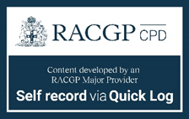The DASH diet for hypertension
Read more about the evidence supporting the Dietary Approaches to Stop Hypertension (DASH) dietary pattern for reducing blood pressure.
.jpg)
HealthCert Education
Did you know that close to 6 million Australians aged over 18 have hypertension (1)? As a major contributor to disease risk and mortality, hypertension is a frequently managed issue for patients presenting in general practice.
While sodium reduction alone is often a physician’s go-to recommendation for lowering blood pressure, the Dietary Approaches to Stop Hypertension (DASH) dietary pattern shows that reducing blood pressure through diet is the result of combining a team of nutrients rather than targeting sodium alone.
Learn more about this topic in the HealthCert Professional Diploma program in Medical Nutrition Management – online nutrition training for GPs.
What foods are emphasised in the DASH diet?
The DASH diet is quite flexible and can be individualised to maximise long-term adherence. It focuses on overall eating pattern and underscores the consumption of colourful fruits and vegetables, low-fat dairy, whole grains, nuts/seeds, beans, lean meats, fish and poultry (2).
The DASH diet also has specific portion targets for each food group to boost heart-healthy nutrients like fibre, potassium, magnesium, and calcium, which have been shown in epidemiologic studies to help lower blood pressure and improve triglycerides (3).
Achievable and practical tips can include:
- Using frozen produce as a more economical way of boosting fruit and vegetable intake.
- Cooking with extra virgin olive oil or using it in dressings.
- Snacking on fruit, nuts, yoghurt, veggies and dips, or cheese.
- Swapping to low-fat dairy products (e.g. skim milk, low fat coconut milk).
The research into the DASH diet
Plentiful research supports the efficacy of the DASH dietary pattern for lowering blood pressure in diverse populations, including men, women, and in various races and ethnicities who have either prehypertension or hypertension (4-7).
The original randomised clinical trial demonstrated that DASH lowered blood pressure in as quickly as two weeks even without lowering sodium intake, suggesting that the combination of foods and nutrients is what provides the greatest blood pressure-lowering effects (2).
The multicentre PREMIER study allocated participants to one of 3 intervention groups:
- "Established": a behavioural intervention that implemented established recommendations;
- "Established plus DASH", which also implemented the DASH diet; and
- An "advice only" comparison group (8).
Both the established and the established-plus-DASH group lost substantial weight, reduced their sodium intake, and increased their physical fitness. Blood pressure and hypertensive status improved for all three groups (8).
A systematic review and meta-analysis of observational prospective studies found that a DASH-style diet decreases the risk of heart failure by 29%, coronary heart disease by 21%, and stroke by 19% (9), while another systematic review showed that adherence to DASH translated to a cardiovascular risk reduction of approximately 13% using the 10-year Framingham risk score (10).
Research supports the use of the DASH diet for the prevention and control of hypertension and hence the risk of cardiovascular disease, diabetes, kidney disease, and gout. Primary care physicians are in a prime position to educate patients and their families about the DASH diet and its benefits.
Learn more with the online HealthCert Professional Diploma program in Medical Nutrition Management.
– Lynette Law, Accredited Practising Dietitian
Engaging with this blog can help meet your annual
|
 How to claim your CPD hours How to claim your CPD hoursIf you consume educational webinars, podcasts, articles, or research on this blog, you can Quick Log CPD hours with the RACGP via the usual self-submission process. You will be asked to reflect on what you have learned, and you will require supporting evidence such as a screenshot. Download the RACGP’s guide to self-recording your CPD here. |
Read another blog: IBS: Looking beyond the low FODMAP diet
References
1. Health AIo, Welfare. High blood pressure. Canberra: AIHW; 2019.
2. Appel LJ, Moore TJ, Obarzanek E, Vollmer WM, Svetkey LP, Sacks FM, et al. A clinical trial of the effects of dietary patterns on blood pressure. DASH Collaborative Research Group. N Engl J Med. 1997;336(16):1117-24.
3. Houston MC, Harper KJ. Potassium, magnesium, and calcium: their role in both the cause and treatment of hypertension. J Clin Hypertens (Greenwich). 2008;10(7 Suppl 2):3-11.
4. Steinberg D, Bennett GG, Svetkey L. The DASH Diet, 20 Years Later. Jama. 2017;317(15):1529-30.
5. Sacks FM, Svetkey LP, Vollmer WM, Appel LJ, Bray GA, Harsha D, et al. Effects on Blood Pressure of Reduced Dietary Sodium and the Dietary Approaches to Stop Hypertension (DASH) Diet. New England Journal of Medicine. 2001;344(1):3-10.
6. Couch SC, Saelens BE, Levin L, Dart K, Falciglia G, Daniels SR. The efficacy of a clinic-based behavioral nutrition intervention emphasizing a DASH-type diet for adolescents with elevated blood pressure. J Pediatr. 2008;152(4):494-501.
7. Lin PH, Yeh WT, Svetkey LP, Chuang SY, Chang YC, Wang C, et al. Dietary intakes consistent with the DASH dietary pattern reduce blood pressure increase with age and risk for stroke in a Chinese population. Asia Pac J Clin Nutr. 2013;22(3):482-91.
8. Appel LJ, Champagne CM, Harsha DW, Cooper LS, Obarzanek E, Elmer PJ, et al. Effects of comprehensive lifestyle modification on blood pressure control: main results of the PREMIER clinical trial. Jama. 2003;289(16):2083-93.
9. Salehi-Abargouei A, Maghsoudi Z, Shirani F, Azadbakht L. Effects of Dietary Approaches to Stop Hypertension (DASH)-style diet on fatal or nonfatal cardiovascular diseases--incidence: a systematic review and meta-analysis on observational prospective studies. Nutrition. 2013;29(4):611-8.
10. Siervo M, Lara J, Chowdhury S, Ashor A, Oggioni C, Mathers JC. Effects of the Dietary Approach to Stop Hypertension (DASH) diet on cardiovascular risk factors: a systematic review and meta-analysis. Br J Nutr. 2015;113(1):1-15.

 1800 867 1390
1800 867 1390.jpg)
-1.jpg)
.jpg)



